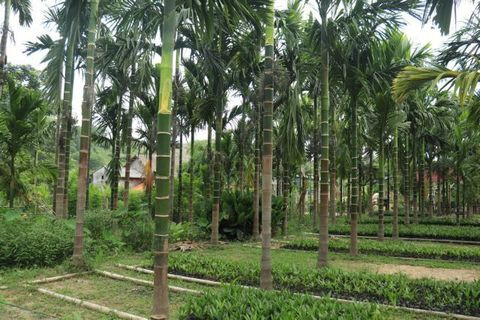
A farmer inspects a betel plant in the northern province of Thanh Hoa. — VNA/VNS Photo
Amid reports of substantial acquisitions of young betel by Chinese traders, Nguyen Nhu Cuong, head of the Department of Crop Production under the Ministry of Agriculture and Rural Development, has cautioned farmers on over-cultivating betel at the detriment of other crops.
Cuong warned that widespread betel cultivation could lead to an oversupply crisis and emphasised the importance of keeping abreast of market trends.
He said this was not the first time Vietnamese betel has been in high demand, saying similar events took place several years ago in the Red River Delta and the Central Highlands.
"Traders have been buying betel through cross-border channels, not as part of any official trade quota between the two countries. Betel is not recognised as a major food source in Viet Nam, and the country currently has no planning for the production of betel," he said.
"It's important to remember it may take between three to five years to harvest betel. Farmers must remain very cautious about its future demand," Cuong added.
He said there has likely been a surge in demand for betel in the Chinese market, but it's just as likely to diminish in a near future.
"Betal does not belong in the category of major food sources such as rice, fruit and vegetable. Even the demand for betel in the domestic market is rather limited," he said.
"We have seen this many times in the past. Once traders stop buying, farmers will almost certainly have to deal with the aftermath,"Cuong said.
The department advised farmers not to abolish other crops to grow betel to avoid incurring potential financial losses.
In the event demand proves stable, farmers and local authorities should work together to build a proper plan for the development and production of betel, as well as to establish a trade protocol secured by long-term contracts and official export channels, rather than dealing directly with traders.
The department's official stand is to advise against growing betel in large numbers as it is not considered a food source.
A similar incident occurred last year with farmers in the Mekong Delta growing off-season dragon fruits. As traders abruptly stopped buying, farmers were left to suffer tremendous financial losses. — VNS
Arial, Verdana, "Trebuchet MS"; font-size: 13px; font-style: normal; font-variant-ligatures: normal; font-variant-caps: normal; font-weight: 400; letter-spacing: normal; orphans: 2; text-align: start; text-indent: 0px; text-transform: none; white-space: normal; widows: 2; word-spacing: 0px; -webkit-text-stroke-width: 0px; text-decoration-thickness: initial; text-decoration-style: initial; text-decoration-color: initial;">He said it is also supporting enterprises to supplement resources and improve competitiveness, adding that solutions to stimulate investment in supporting industries in this period are also essential.
The municipal People’s Committee also passed a plan to carry out the supporting industry development programme between 2022-23 with assistance in supply-demand connection, production management, and human resources training.
For its part, the Ministry of Industry and Trade said it would actively implement the project to restructure the industry and trade sector to facilitate the country's industrial production in 2023.
Top priority would be given to creating products under national brands. These products could be competitive in regional and world markets, participating more deeply in the global value chains.
The ministry would continue restructuring industrial production sectors, focusing on increasing the proportion of processing and manufacturing industries and reducing the proportion of processing and assembling for industrial products manufactured in Việt Nam.
At the same time, it would review mechanisms and policies affecting each industry and product, gradually remove difficulties for enterprises and increase localisation rate.
Last year, the country's IIP went up 7.8 per cent year-on-year, with a growth of 6.8 per cent recorded in Q1, 9.8 per cent in Q2, 10.9 per cent in Q3, and 3 per cent in Q4.
Sectors posting impressive growths in 2022 were beverage with 32.3 per cent; medicine, pharmaceutical chemistry and herbs (19.2 per cent); machinery production (19 per cent); wood and wooden products (17 per cent) besides processed seafood (16 per cent), phone parts (15 per cent) and motorbikes (10 per cent).
In the year, Bắc Giang saw the best IIP growth with 31.5 per cent, followed by Cần Thơ (30 per cent), and Vĩnh Long (25 per cent). — VNS